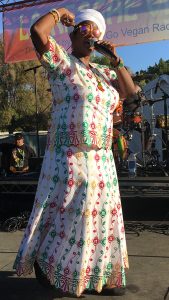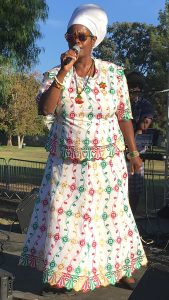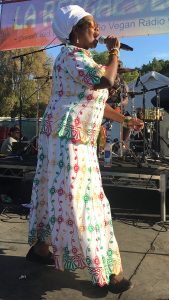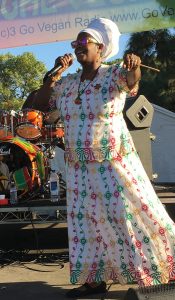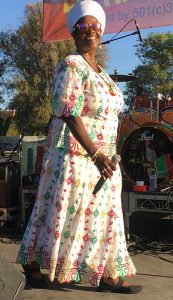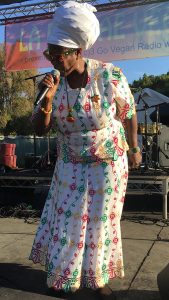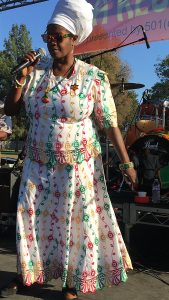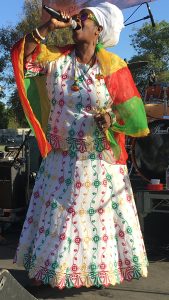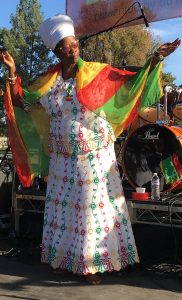Sister Carol: “Reggae Inna Mi Blood”
Sister Carol, respectfully and affectionately known as the “Black Cinderella” and “Mother Culture,” is both a pioneer and pillar of reggae music. The last of three female reggae artists to ever be nominated for a Grammy award, Sister Carol is one of the most highly accomplished, glass ceiling-shattering, charismatic, and unique figures in the entirety of reggae’s rich, robust history.
I was fortunate to interview Sister Carol after she headlined the first ever L.A. Reggae Vegan Fest, held on the first Sunday in October. The many topics we discussed included: veganism and living an “ital” lifestyle; Jamaica and some of the problems it’s confronting; marijuana; different “mansions” of Rastafari and the diversity that exists in Rastafarian beliefs and practices; respect for women; her fondest memories of late reggae superstars Dennis Brown and Sugar Minott; and much, much more. What follows is a transcription of the interview, modified only slightly for clarity and space considerations.
Q: Sister Carol, greetings and give thanks for this opportunity to interview you at the very first L.A. Reggae Vegan Fest! Consistent with your Rastafarian faith, throughout your historic career in reggae, you have often promoted organic, ital food, and, living a healthy, natural lifestyle; so it’s only logical you’d be invited to perform at this event. Do you agree?
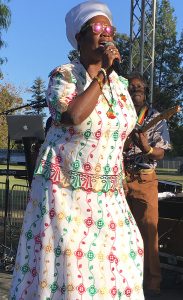
Sister Carol: Most naturally.
Q: Your song “Veggie, Veggie” and also “Strong and Fit,” a track from off of your Grammy-nominated album “Lyrically Potent,” immediately come to mind. And I understand your passion for organic food and cooking has caused you, at times, to seriously consider opening up your own restaurant. True?
Sister Carol: Most definitely.
Q: I know that you are still doing plenty of touring and traveling, but are you primarily living in Jamaica these days?
Sister Carol: Yes, I am.
Q: What part of Jamaica [do] you liv[e] in?
Sister Carol: Saint Mary.
Q: Sister Carol, at the end of August the [Jamaica] Gleaner reported on a study that showed over a seven-year period there has been a 100 percent increase in obesity in boys, and between 60 and 70 percent in girls, in Jamaica. Now, in May, the Gleaner also reported that the Director General of the food and agriculture organization [(FAO)] of the United Nations blamed the importation of cheap food imports loaded with salts, fats, and sugar for obesity in the Caribbean. What are your thoughts about this issue? And what can be done to encourage the youth, especially in Jamaica, but also here in the United States, to eat more vegetables and other healthy foods? And [to consume] less processed and fast food?
Sister Carol: Part of my entire livity as a Rastafari woman is always to promote eating fresh food, drinking good water, and promoting health and wellness. Which includes exercising. And we’ve been singing and promoting this lifestyle within the music for over thirty-seven years now. So, in addition to what they’re doing is like something we’ve been preachin’ and teachin’ for quite some time now. And not just preachin’ and teachin’, but actually livin’ that lifestyle. You know, the livity? Having a plant-based diet. Which is healthier for the structure. Because you never see a cow eating [a] chicken. Or beef. A cow eats grass, vegetables. Because the cow is an herbivore, and we are also herbivores. We’re supposed to eat a plant-based diet. ‘Cause once you have the intake of flesh within flesh, that’s the beginning of sickness. And we’ve been preachin’ and teachin’ that for a long time. So it’s really an honor for me to be here as part of this very 1st [L.A. Reggae] Vegan Festival. Like you say, songs like “Strong and Fit” and “Veggie, Veggie” among many other songs that we write about ital food, exercise, and all of that.
Q: Does it bother you to see some of the Americanization – the foods that come [to Jamaica] from America – for example, I know when I visited Jamaica, one thing that was easy to see was that Kentucky Fried Chicken [is] very popular it seems. Does that bother you to see –
Sister Carol: Well it’s the lifestyle of Babylon, always to confuse the people and them living a lifestyle opposite of what they’re supposed to be doing. Because it’s not just the food, you know? It’s everything [in] general. You have a thing, what do they call it now….? A PlayStation generation that is in existence right now. That every youth [has] a tablet or some kind of [electronic] device a-play. And that youth is so in tune with that device that there’s totally no sensation around him or her. They don’t even go outside to exercise, and run up and down and play and think – to be in touch with humanity. It has totally been destroyed by technology. And the youth press the buttons, and most of the time when they play a [computer] game, it’s one person a-try and kill the next person. Which have a mentality that plays out in our society. Sometimes, you can’t even overstand where it’s coming from. So these are things we talk about and sing about over the years.
Q: Respect.
Sister Carol: The food. The livity that Babylon encourage[s], you know?
Q: Respect. Now Sister Carol, Jamaican scholar Ennis B. Edmonds writes [at page 60] in his book “Rastafari: From Outcasts to Culture Bearers” that one “indicator of Rasta’s departure from Babylon is their commitment to ital living” – which is, as you were just speaking of: “a commitment to using things in their natural or organic states.” In addition to food, the same is true for marijuana, would you agree?
Sister Carol: Very much so.
Q: In fact, on almost every single one of the many albums you’ve released over the roughly four decades you’ve been a reggae star, you’ve included one or more songs celebrating marijuana. I’m thinking about songs like “Red Eye,” “Herbal Affair,” [and] “Wicked Collie,” which are some of my favorites. But, just last year, in 2017, when you released your last album called “THC/The Healing Cure,” you devoted every single song on [the] album to ganja. Why?
Sister Carol: Because we believe in Mother Nature so much; is long time we a-tell them about this very special plant that ha[s] tons of medicinal properties for humanity. But it’s always come under so much scrutiny that Babylon actually put us through so much brutality for this very same plant they’re all cashing in on today. So I’m letting them know: this is not just today I’m trying to jump on the bandwagon; we’ve been telling you for years about this plant. You done killed [so many] people and arrested and destroyed so many families for this same plant you [are] trying to cash in on now. But you know what? I’m not gonna try to come at you your way. I’m gonna tell it to you with the gift that Jah gave I, [and] put it in songs. To edify and educate my people about this plant that you’re commercially cashing in on. I’m just doing it [with] a, how you call it? A heartical vibration, you know? So this album THC [(The Healing Cure)] is a very meaningful album to celebrate the plant. And to give it a sense of freedom [so] people don’t [feel] all this stigma attached to it. Because you’ve never been arrested for scallion, nor thyme, nor onion.
Q: Right.
Sister Carol: So why you arrest me for marijuana? It’s a plant.
Q: Now you’ve said before that although you knew you were a Rasta from a very young age – and that you even saw His Imperial Majesty [(H.I.M.)] Haile Selassie [I] when he visited Jamaica in 1966. And, that you believe he looked at you and waved from his car window [at you] when you were just seven-years-old, that you still [nonetheless] grew up in a Christian household. And –
Sister Carol: Let me correct you. I don’t “believe” that. I know that. I saw that. He waved to me. I don’t “believe” that, I know that.
Q: Thank you. Initially, you had to keep being a Rasta a secret from your parents, even hiding a picture of Selassie you kept so they wouldn’t see it. When did your parents accept your decision to be a Rasta, and how did that happen?
Sister Carol: When dem see that dem can’t stop me anymore. Dem say, we can’t change her, we haffi just leave her.
Q: How old were you?
Sister Carol: Probably about 18. My mom and pops actually embraced me and the lifestyle they saw me clinging to. They didn’t really accept it, but they had no choice because they told me at that point, there were certain things that they expect from me; so if I did my part – they wanted me to go to school, get a degree, [and] I got a degree, you know what I mean?
Q: So, you were able to satisfy your parents?
Sister Carol: Yeah. So mi say, alright, mi a Rasta, and they just love me. And they love me even more. They just didn’t know that they [were] going to love me so much being a Rasta. Because Rasta have so much negative connotation, and Rasta so anti-colonial and anti-Babylon, and anti-world; they [were] just scared because they didn’t know [better]. But they know [now]. Because I’m the one they run to when dem want feeling and love. Because Rasta love like that. ‘Cause you know, Jah is love.
Q: Respect. In an interview you gave that was later published in 1992 as part of a collection of interviews in a book called “Reggae Island” by Brian Jahn and Tom Weber you said [at page 216]: “I think that a lot of young people in Jamaica figure out everything is a sellout, the politics is a sellout, the church. So a lot of them turn to music, and the type of music that really helps them in their lives is the conscious type of music. It forces them to look into themselves and see their life[.]” Over a quarter century later, have things gotten better or worse in Jamaica, and why?
Sister Carol: In terms of what?
Q: Well –
Sister Carol: In terms of the music, in terms of politics, in terms of the livity of the people, or what?
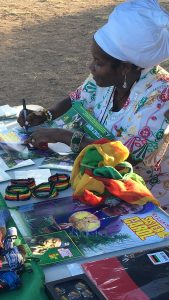
Q: The people in terms of how they’re living and the society in Jamaica. So that would include the politics. Have things gotten better or worse in the twenty-six years since you gave that [statement in “Reggae Island”]?
Sister Carol: Things have gotten worse somewhat in terms of the livity of the people. Because you have all these people that put so much faith and trust in the church. And the church let them down. And that plays on the psyche. If you put your whole mind, soul, and heart in the church, and what is the guy in the church doing? Molesting your own children? That mash up the people in dem head! Not just in Jamaica, [but] worldwide. So it’s not just politics. Religion. Which is confusion. Mash up the people’s mind! They a-search deep within dem souls. To find a gear or find a way to even survive. And sometimes, music does that. And reggae music is so powerful, universally when they hear the music, even if they don’t know what you’re saying, they identify with the beat. The syncopation of the drummer and the bass is so similar to that of the heart, that “Ba-Boom. Ba-Boom. Ba-Boom.” That same vibration. They feel it and they adapt to it. That’s why the music is so contagious and so magnetic. And then when they get to read the words of the song, and understand what you’re saying? It’s like a revolution. (Laughing.) It’s a powerful music. And that’s why Bob Marley’s music is getting bigger and bigger every day. Because it’s the truth.
Q: So beautiful, Sister. Sister, what in your opinion, are the biggest problems facing Jamaica right now?
Sister Carol: Religion. Politics.
Q: Corruption?
Sister Carol: (Laughing) Corruption is just a sub-umbrella under politics, you know? You have to be corrupted to be part of the politics.
Q: Now Sister, in 1973, when you were 14, your family immigrated from Jamaica to Brooklyn, New York. A blog published on a forum called “everyculture.com” asserts “[a]lthough Jamaica is not immune to color distinctions, [Jamaican] immigrants become much more conscious of their blackness . . . than they did back home in Jamaica, where blacks are the majority and many are highly respected leaders. In the United States[,] they must adjust to living in communities where blacks are treated as a numerical, political, social, and economic minority.” Does this assertion about being a new Jamaican immigrant in the United States, does it ring true to you?
Sister Carol: Well, you see what it is sometimes, Jamaican people have a way of putting down themselves so much that they have to be exposed to something else. If every Jamaican had the opportunity to get a visa to come to America, they would love and appreci-love themselves and the culture so much more. Because they’re thinking like, some big thing is happening, or some greener grass [exists] and they’re not a part of it. [But] sometimes it is not the reality, you understand? But then, on the other hand, the resilience of the people has somewhat made the culture rise to the point where Jamaica is seen not as a small little dot on the map anymore. But a big country where everybody a-look towards! And everybody’s using the Jamaican culture to enhance their livity, and to make a living. Jamaican music is everywhere! It’s Reggaeton. It’s Afrobeat. It’s whattya call it? Tropical House. All of this is coming out of the resilience of the people that stood up and said, alright, we a come with our own thing. And people gravitate to it. So, you find that a part of it is ignorance. ‘Cause they just don’t know how blessed they are to be in what we used to know as “the paradise.” Before colonial people take over and come with their agenda, you know?
Q: On your 1989 Album “Jah Disciple” released by Real Authentic Sound (or “RAS”) Records, you sang about some of the difficulties you faced being a teenager from Jamaica new to the United States. In the song “Run Things,” you sing: “When mi come America as a teenager from sweet Jamaica, reggae music used to play but it never popular, like the other rest of music inna that era. Yankee people used to laugh and tease me about Jah, say mi come ‘pon a boat full of green banana.” As a teenager, how did you cope with being teased and bullied because of your religion? And for being a new immigrant in the U.S.?
Sister Carol: It was a challenge at first. But then mi stay true to my roots, you know? And I’ve lived it out and watched every single person want to be a Jamaican now (“Oh my cousin’s cousin is Jamaican, or my grandmother’s grandmother is Jamaican.”). Because like I [was] tell[ing] you, the resilience of the people and the mindset. No matter what it is, they’re gonna overcome.
And we’ve actually hurdled over everything that’s come at us. And now everybody wants to be a Jamaican. So, I remember that time when it wasn’t really popular. But now it’s really popular. Really, really popular.
Q: When you [were new] to New York [City] as a fourteen-year-old, what did you miss most about Jamaica?
Sister Carol: The elements. The sun. The sand. The sea. The weather. And the food. And the music, ‘cause at that time reggae music was not popular in America. Every time you hear a reggae song on the radio [then] you had to run and turn it up loud. ‘Cause you probably won’t hear it again for another week (laughing).
Q: Now I know one place you found acceptance early as you graduated from high school and went on to the City College of New York, where you received a degree in education, was the burgeoning New York dancehall and DJ scene that existed at that time in the city. Now, during this time, the famous DJ Brigadier Jerry became a major influence on you, true?
Sister Carol: Very much so.
Q: How and where did you first meet and become friends with Brigadier Jerry?
Sister Carol: I met Brigadier through a dear friend of mine named Sister Melanie. And upon meeting Brigadier Jerry, I was really shocked to really see him, and to see who he was. Because upon hearing him, I thought he was a very big brethren; he had such a big voice, I didn’t know he was just a slim person like that. Wow! (Laughing.) But his spirituality stood out more than anything else. Or anybody else I’ve ever heard on the mic[rophone]. That freestyling, chanting. The spiritual aspect of it really gravitated to me and ever since that day, he’s been an inspiration to me. He instilled that courage, you know: “You can do this too” [be an international recording star]. “You can do this and free yourself.”
Q: Did he also [help to] school you in terms of being a Rasta?
Sister Carol: No, not in that light. But they say in Jamaica, “actions speak louder than words.” Because of his spirituality and how he was coming through. Like with his quotes. And his styles. You know, the message. The biblical connotations and everything. It definitely shaped and molded me.
Q: Other than Brigadier Jerry, are there any other groups or individuals that you credit for your own personal spiritual development as a Rasta?
Sister Carol: Yes. Burning Spear. Mighty Diamonds. Of course, Bob Marley. The I-Threes. Ras Michael. Mutabaruka. I’m schooled by everyone who came before me. And I’ve been inspired by everyone who came before me.
Q: You’ve said before that, when you were a young girl in Jamaica, hearing Junior Byles’s hit song “Place Called Africa” really “opened up your consciousness.” Could you say a little bit more about how that song helped to widen your horizons?
Sister Carol: Well, as a youth growing up, my most popular question was, I wanted to know: Who am I? Where did I come from? How did I get here? I must come from somewhere. I can’t just arrive on an island like this. Where did I come from? There was no one around you at that time because everybody was into church, or into something else, I don’t know. But they couldn’t answer those questions. And you were scared to ask them. Because they’d get angry. They weren’t angry because you asked. They were angry because they didn’t know how to answer you.
Q: In terms of embracing your Afrocentricity?
Sister Carol: Right. And most of them are so colonial-minded, that they’re like “how dare you ask about Africa?” Because they didn’t know. Really, that’s the truth. So I’m sitting there and listening. I went to school in Jamaica for ten years. Started school at four and I left [Jamaica] at fourteen. And through that ten years, I never hear nothing about Africa! Not one time! Not one time. So when I heard this song, and I was about nine (Singing): “There’s a place called Africa, far, far away. There’s a place called Africa many miles away.” Then he says (Singing): “Mama says that’s where I’m from, and I know she can’t be wrong. So take me back to Africa. Mama, how did I get here . . . . ” So that’s the first time I’m realizing, that’s where we come from: Africa.
Q: That’s powerful.
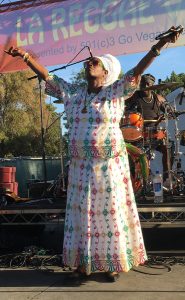
Sister Carol: Yeah. I was about nine years old when that all came to me. And then I start researchin’. And when I came to America now at about 14, school things like social studies, historical things, and you start to study Africa and you start to put the pieces together. And you say, ah, [Africa] is where we come from. When you start singing, and you start touring the world, and you go to places like Ivory Coast, Senegal, Gambia – all of these countries I’ve had the opportunity to tour. I recognize where the culture come[s] from. Why we eat the way we do, why we do things the way we do. So it’s a learning process, and mi still a-learn.
Q: In an interview you did with Stan Evan Smith for Jamaicans.com, you were asked if males in the reggae industry are only comfortable with women in subordinate roles. And you said: “I think some of our male counterparts are just as confused as the teachings they got. Religion has portrayed a devilish role in regards to the woman, therefore some of them do not know any better.” Do you recall saying that?
Sister Carol: Yeah man, mi say that.
Q: Now there is great focus on the individual within Rastafari, and therefore great diversity in terms of how the religion is practiced with many different groups or “mansions” of Rastafari – as they are known – that exist. True?
Sister Carol: Uh-huh. (Nodding.)
Q: Now on your very first album in 1981, “Mother Culture,” which, in addition to “Black Cinderella,” is a title of respect by which people know you all over the world, you chant that you’re a member of the “Twelve Tribes [of Israel].” Which is one of the most well-known mansions of Rastafari, true?
Sister Carol: True.
Q: True that it’s one of the most well-known, and also, that you’re a member of that mansion?
Sister Carol: True.
Q: Of the mansions of Rastafari that exist, would you say that Twelve Tribes accords women the most rights and the most respect?
Sister Carol: Well I would say that out of all the mansions of Rastafari, Twelve Tribes is the first one to really give the woman a voice. To give the woman a chance to speak. And to officiate [during religious ceremonies and celebrations]. To function. Fellowship. Everything. Because in most mansions they’re very deep into the Bible, and they take that stance, that man leads everything. But when you rewind the tape to where Rastafari is coming from, and to see and to recognize the importance of the coronation of His Imperial Majesty – and HerImperial Majesty. It was very important for the entire world to see the light in which He saw the woman. To have Her coronated not two weeks after – or two weeks before. [At] the same [time] as him, just to show the world. Not just about equality, because we’re not fighting for [only] that. I’m talking about the balance. Male and female. King and Queen. Emperor and Empress. Sun and moon. Ying and yang. Son and daughter. To show the world the importance of having that balance.
Q: You sang about that on stage today, and that makes a lot of sense to me. Which is why I wanted to ask you a little about two other [major] mansions of Rastafari. Because I’ve been reading about this a little bit. And for example I read about the Nyabinghi and the Bobo dreads, and –
Sister Carol: And sometimes, sometimes, within [the] Nyabinghi [mansion of Rastafari] some people would have a problem if they [saw] a sister playing the drum. ‘Cause I don’t know, it’s a misund—someone must have said, “the woman nuh play drums. The woman can’t play drums.” But what is wrong if she play[s] the drums!? She can play the drum!
Q: Ennis Edmonds has written about the Nyabinghi mansion of Rastafari [at page 62 in his book “Rastafari: A Very Short Introduction” (Oxford University Press 2012)]: “Ironically, this branch of Rastafari takes its name from Nyabinghi, the legendary African queen, and yet it subjects women to male authority and excludes them from circles of males during the ritual smoking of ganja.” And with respect to the Bobo dreads another [very large, long-established] mansion of Rastafari, [Edmonds] [asserts]: “Bobo Dreads’ patriarchal system brands women as distracting to men’s spiritual pursuit and they are relegated to the background of communal life[.]” [page 65] They have clothing regulations in terms of covering their bodies [around men], and also, they are not allowed to cook for men, and, they must seclude themselves at times due to perceived impurities [stemming from menstruation]. So I wanted to raise this with you. And I’m not naming any names, [nor] am I asking you to name any names, but to get to the bottom as much as possible as it concerns gender inequality as it exists in reggae music: When you said in your interview for Jamaicans.com that some males in the reggae music business don’t know any better but to treat women as second-class citizens or worse, were you speaking about Rasta producers and artists who identify with these other mansions [of Rastafari] – ones that [perhaps] do not give women the respect that they should?
Sister Carol: This is not just limited to reggae music. It’s just in regards to the world at large who don’t see women in the light they should be seen. And honored. And respected in that light. And if they could see it within that light – I’m not here to put down anyone or to say anything negative. But what I do respect about the Bobo dreads is that separation they have from the woman, you know, within the [menstrual] cycle. You see, you have to understand, you know, the woman go so deep she represents mama moon. And she is the first one to sit down and mathematically figure out this whole thing with the earth’s cycle and the moon. And know that it’s every 28 days. And they recognize that. Which a lot of people think is confusion, but it’s not confusion. The woman actually need[s] that time and space for herself. To just stay focused. She’s in charge of her man, her children, [and] her community. So most times, she forgets about herself.
Q: So that doesn’t bother you then, with respect to what the Bobo dreads do?
Sister Carol: No, it doesn’t. But I’m trying to say, a lot of the principles and the teachings have to be, how you say, updated. Because in reality, a woman never start a war. A woman never start a fight. A woman, if she’s gonna kill you, because you mess with her children, or you mess with her – men just start war fi nothing! Men just press rocket fi nothing. Because they’re not just egoist, but they’re ego-testical-ly oriented for chauvinism and macho. And dem haffi just humble themselves and remember all we have gwaan is a woman bring you come here. So if you just look at it in that light and respect Mother Nature. Like I was saying, nature teach you how to respect the woman and you don’t even see that way. Every man who want to smoke weed, it’s the woman weed you a-smoke. Because the man-thing, can’t smoke! Man-ting seedy-seedy. The earth is the lord and the fullness thereof; this is Mother Earth. She gives life to everything and she still embrace[s] everything that dead. And you want to step on me? And mi represent her? Mother Earth, Mother Africa, Mother Nature. Come on!
Q: Do you reason, at times, with Rasta brethren –
Sister Carol: Sometime me no haffi talk to anyone. Mi just sing [a few] songs. If you pickup, you pickup, if you nuh pickup, next time. Mi no haffi convince nobody. Or debate with nobody. Mi just a-talk truth which come through me.
Q: Respect. Now Sister Carol, an article in the Gleaner earlier this year titled “No Female Reggae Grammy Winner to Date” noted that “[i]n over three decades of history in the reggae Grammy category, only three females have ever been nominated”; the last female to walk away with a nomination being, of course, yourself, when you were nominated in 1997 for your album “Lyrically Potent.” As the last female reggae artist to be nominated for a Grammy award – over two decades ago – has the situation for women artists in reggae improved since you were nominated for the Grammy, has it stayed the same, or, has it gotten worse?
Sister Carol: There’s very, very slight improvement. No quantum leap.
Q: How so?
Sister Carol: You hear a lot more women right now stepping out and recording, and you know, getting the music out there. Getting the recognition some of dem searching for. But really and truly, dem not see women in the light where they’re supposed to see women. Take for instance today. There’s four main artists on the show. And you have one woman and three brothers. And these brothers are just, they’re just so, “she’s gotta go on first.” Because all these brothers are stars they’re telling themselves. And they’re not gonna go on[stage] before the woman. Because dem just feel, “No I.” You understand?
Q: Yeah.
Sister Carol: So I didn’t think it was fair for the people to just stand there, waiting, waiting, waiting. So I went on first. I went on first and not only did I go on first as one of the four main artists, but I was telling them don’t try to disrespect this thing. Because in this time there’s a paradigm shift where the woman will have to be seen and recognized in every element of the society. Not just “me too,” but all the way!
Q: What needs to happen Sister Carol, in your opinion, for the reggae music business to provide fairer and more equal opportunities for women?
Sister Carol: Women just have to be vigilant about what they want. Maintain the self-love, the self-respect, the self-esteem, and demand the respect [they deserve]. It must come. It must come.
Q: Many people think reggae star Etana’s album “Reggae Forever” has a high chance of breaking the long drought in female reggae artist Grammy nominations this year. Do you know Etana, and do you have any thoughts about that?
Sister Carol: I know of Etana. I think she’s a very talented singer. As far as her album is concerned, I can’t say anything about the album because I haven’t heard it in its entirety.
Q: Now Sister Carol, just a few final questions and I want to again thank you for the blessing of this time with you. In an interview you did with [Kayla Kush for] “Rootfire” a year ago, you were discussing how you have many influences and friends in reggae music. And you mentioned how you were friends with the “Crown Prince of Reggae,” Dennis Brown. True?
Sister Carol: Very much true.
Q: What is one of your fondest memories of Dennis Brown?
Sister Carol: Hmm. Got tons of memories of Dennis Brown. And I’m [going to] share with you two of my fondest memories.
Q: Please.
Sister Carol: Once I went to a Dennis Brown concert in New York City. This place called “Studio 54.” And at that time I’d just fractured one of my [feet]. And I had a bandage around it, but you know, Dennis Brown is my artist, and I knew him since I was seven. And he was nine years old. Because we’re from the same neighborhood. And he was like a little Stevie Wonder. A little star boy when we were growing up. But, you know, he grew up to be a superstar and he inspired me along the way. But, I went to the show, it must have been in the 90s, and I was just standing there having a good time. Just musically enjoying the show like I always did. And he brought the band down, and he goes, “Is that my Sister right there, the Black Cinderella?” He said, “Come on up, my Sister!” And believe you me that was just such a gratifying moment for me. For him to call me up on stage to sing with him. He had no shirt on or anything. And the place just exploded. And then, later on, when I decided to produce an album called “All I Have Is Love,” a tribute to Studio One (because I’m a Studio One child myself, my father [sound engineer Howard East] worked with Studio One), I wanted to do something with the riddims I grew up on. And I asked him if he could give me [one] and he said, “Yes Sister, anytime!” So, the actual moment of me producing Dennis Brown was so, how you say now? I was dumbfounded. I wanted to tell him, “do that line.” And everybody’s like, “this is Dennis Brown, you can’t tell Dennis Brown that.” And so I just let him sing. And he did this song called “All I Have Is Love.” Which is really an original Johnny Osbourne [song]. So Dennis sang the song. And then Johnny said, “That’s my song, he can’t sing it like I do.” So he did it too. So on the album, I merged both voices. And it sounds like they’re together in the studio, but they didn’t record it like that.
Q: What album is that again?
Sister Carol: It’s called “Tribute to Studio One: All I have is Love.”
Q: And that came out on [your] Black Cinderella [record] label?
Sister Carol: It’s Black Cinderella label but it was distributed by Easy Star [Records] out of New York City. So Dennis Brown and Johnny – Johnny said all his life he wanted to do a duet with Dennis, and that song make him feel like “Yes!,” you know? So dem two moments with Dennis Brown [are] most memorable. But we [spent] a lot of time together and [had] a lot of great moments.
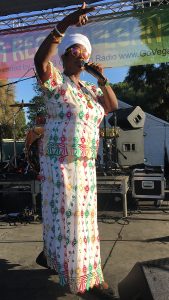
Q: Also in that same [Rootfire] interview, you mentioned being friends with the late Sugar Minott, who famously collaborated with you on the beautiful song “Sell-Out” [on your “Lyrically Potent” album]. Same question [as with Dennis Brown], what are some of your fondest memories of Sugar Minott?
Sister Carol: That’s my brother. So many fond memories. But one that comes to mind is touring Japan, and being a part of the Reggae Japan Splash 1986. Sugar and I became very close as friends. Like brother and sister. And I was pregnant at the time and he just, he just decided to take care of me. That stands out. The very first dancehall style that was kept in Japan, was kept in a place called Shibuya. With myself, Frankie Paul, rest in peace, Sugar Minott, rest in peace, [and] Tenor Saw, rest in peace; we all gathered that night for the first dance to be held in Japan – dancehall style. And Sugar Minott was operating the sound, and he was telling all these guys how to string up the sound. And they actually drew a diagram. It came out in a magazine [to show] how you string up the sound. So Sugar Minott has so many accolades that he’s not credited for. And some of these things people have to talk [about]. He was like The Godfather. The dancehall thing. Not just in Jamaica, but worldwide. And his contribution is humongous. And that stand[s] out in my mind. Sometimes when I get a chance, I listen to that dance that was held in Japan. [In] 1986. It was like the introduction to dancehall style: turntable and microphone, and artist and DJ, and singer. It’s very big now in Japan, but that’s where it started from.
Q: My last question Sister Carol is what new projects, new music, and other developments do you want to make sure all your fans are aware of, that they should watch out for this fall, or in 2019?
Sister Carol: 2019 is going to be a very interesting year because there are so many projects right now that are getting ready to be birthed. I have a brand new album I just completed. And you’re the first person to interview me [who] I’m gonna tell the name [of the album] to. The album is called “Reggae Inna Mi Blood.”
Q: Nice!
Sister Carol: Yeah. Meaning that a lot of people are getting confused about reggae and where it’s going. Remember Bob [Marley] saying, this music is just going to get bigger, and bigger, and bigger until it find[s] the right people? But I’m not scared who’s playing reggae or who’s doing whatever to reggae. Because it’s already in my DNA. It’s inna mi blood.
About the Author: Stephen Cooper is a former D.C. public defender who worked as an assistant federal public defender in Alabama between 2012 and 2015. He has contributed to numerous magazines and newspapers in the United States and overseas. He writes full-time and lives in Woodland Hills, California. Follow him on Twitter at @SteveCooperEsq
Photos by Stephen Cooper
Preview YouTube video Sister Carol Veggie Veggie
Preview YouTube video Strong and Fit
Preview YouTube video SISTER CAROL – RED EYE
Preview YouTube video Sister Carol ~ Herbal Affair
Preview YouTube video Sister Carol : Wicked Collie – CD Jah Disciples RAS R.
Preview YouTube video Sister Carol – Ram the Party
Preview YouTube video Run Things
Preview YouTube video Junior Byles – A Place Called Africa (Lee Perry)
Preview YouTube video Shackles
Preview YouTube video Sister Carol ~ BLACK CINDERELLA
Preview YouTube video All i have is love – J.Osbourne & D. Brown
Preview YouTube video Sell-Out
Preview YouTube video japansplash 1986 reggae jamaican music live

Stephen Cooper is a former D.C. public defender who worked as an assistant federal public defender in Alabama between 2012 and 2015. He has contributed to numerous magazines and newspapers in the United States and overseas. He writes full-time and lives in Woodland Hills, California. His twitter is: @SteveCooperEsq

